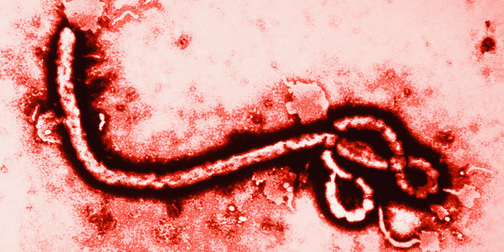Should Americans Be Worried about Ebola?
11/12th Grade ELA/ERWC
5-Day Critical Thinking Activity
Daniel J. Harrison
INTRODUCTION
In this task, students will examine editorial and opinion articles from online newspapers and political think-tanks regarding the recent issue of Ebola in the United States to determine whether the facts point toward fear or calm. Students will examine the case from a variety of points of views, differentiate the facts from opinions, determine whether certain opinions are more valid, and why. Students will conclude with a persuasive essay where they will clearly defend one point of view and effectively negate the other point of view.
COMMON CORE STANDARDS
CCSS.ELA-LITERACY.RI.11-12.3 - Analyze a sequence of events and explain how specific ideas interact and develop over the course of the text.
CCSS.ELA-LITERACY.RI.11-12.6 - Determine an author's point of view in a text in which the rhetoric, style, and content is particularly effective.
CCSS.ELA-LITERACY.RI.11-12.7 - Evaluate multiple sources of information presented in different media or formats to address a question or solve a problem.
CCSS.ELA-LITERACY.W.11-12.1 - Write arguments to support claims in an analysis of substantive topics, using valid reasoning and relevant evidence.
CCSS.ELA-LITERACY.W.11-12.7 - Conduct short research projects to answer a question; demonstrating understanding of the subject under investigation.
CCSS.ELA-LITERACY.W.11-12.8 - Gather information from diverse authoritative points of view, and combine them into a convincing flow of ideas.
In this task, students will examine editorial and opinion articles from online newspapers and political think-tanks regarding the recent issue of Ebola in the United States to determine whether the facts point toward fear or calm. Students will examine the case from a variety of points of views, differentiate the facts from opinions, determine whether certain opinions are more valid, and why. Students will conclude with a persuasive essay where they will clearly defend one point of view and effectively negate the other point of view.
COMMON CORE STANDARDS
CCSS.ELA-LITERACY.RI.11-12.3 - Analyze a sequence of events and explain how specific ideas interact and develop over the course of the text.
CCSS.ELA-LITERACY.RI.11-12.6 - Determine an author's point of view in a text in which the rhetoric, style, and content is particularly effective.
CCSS.ELA-LITERACY.RI.11-12.7 - Evaluate multiple sources of information presented in different media or formats to address a question or solve a problem.
CCSS.ELA-LITERACY.W.11-12.1 - Write arguments to support claims in an analysis of substantive topics, using valid reasoning and relevant evidence.
CCSS.ELA-LITERACY.W.11-12.7 - Conduct short research projects to answer a question; demonstrating understanding of the subject under investigation.
CCSS.ELA-LITERACY.W.11-12.8 - Gather information from diverse authoritative points of view, and combine them into a convincing flow of ideas.
PROCESS
1. Students pick at least one source from the first collection of sources below (#1-3)
2. Students pick at least three sources from the second collection of sources below (#4-10)
3. Students pick at least one other source from either collection of sources or a relevant other source
4. For each source, make an exhaustive list of all the facts and a separate exhaustive list of all the opinions
5. Determine which opinions are valid based on context, date of publication, the author, etc. and highlight them
6. Develop a thesis statement answering the question: "Should Americans be Worried about Ebola?"
7. Based on that thesis, write a five-paragraph persuasive essay defending that view, citing from the consulted articles
1. Students pick at least one source from the first collection of sources below (#1-3)
2. Students pick at least three sources from the second collection of sources below (#4-10)
3. Students pick at least one other source from either collection of sources or a relevant other source
4. For each source, make an exhaustive list of all the facts and a separate exhaustive list of all the opinions
5. Determine which opinions are valid based on context, date of publication, the author, etc. and highlight them
6. Develop a thesis statement answering the question: "Should Americans be Worried about Ebola?"
7. Based on that thesis, write a five-paragraph persuasive essay defending that view, citing from the consulted articles
INFORMATIONAL TEXTS TO CHOOSE FROM
1. US Center for Disease Control
2. The World Health Organization
3. The Brookings Institute
4. The New York Times: What We're Afraid to Say About Ebola
5. Politico: GOP Doctors in House Seek Travel Ban
6. The Washington Post: The Ebola Travel Ban is Really Popular. Here's Why It's Not Happening
7. Fox News: Nothing to Fear with Ebola (video)
8. NBC News: Bioethicist: Why Americans Should Really Worry About Ebola
9. MSNBC: How the NRA is Making the Ebola Crisis Worse
10. CNN: Why An Ebola Epidemic is Spinning Out of Control
1. US Center for Disease Control
2. The World Health Organization
3. The Brookings Institute
4. The New York Times: What We're Afraid to Say About Ebola
5. Politico: GOP Doctors in House Seek Travel Ban
6. The Washington Post: The Ebola Travel Ban is Really Popular. Here's Why It's Not Happening
7. Fox News: Nothing to Fear with Ebola (video)
8. NBC News: Bioethicist: Why Americans Should Really Worry About Ebola
9. MSNBC: How the NRA is Making the Ebola Crisis Worse
10. CNN: Why An Ebola Epidemic is Spinning Out of Control
EVALUATION
| research_paper_rubric.docx | |
| File Size: | 12 kb |
| File Type: | docx |
CONCLUSION
Students will have demonstrated an ability to differentiate facts from opinions, identify which opinions have validity, and combine facts with valid opinion to form a decisive, convincing argument that they back up with quality evidence.


